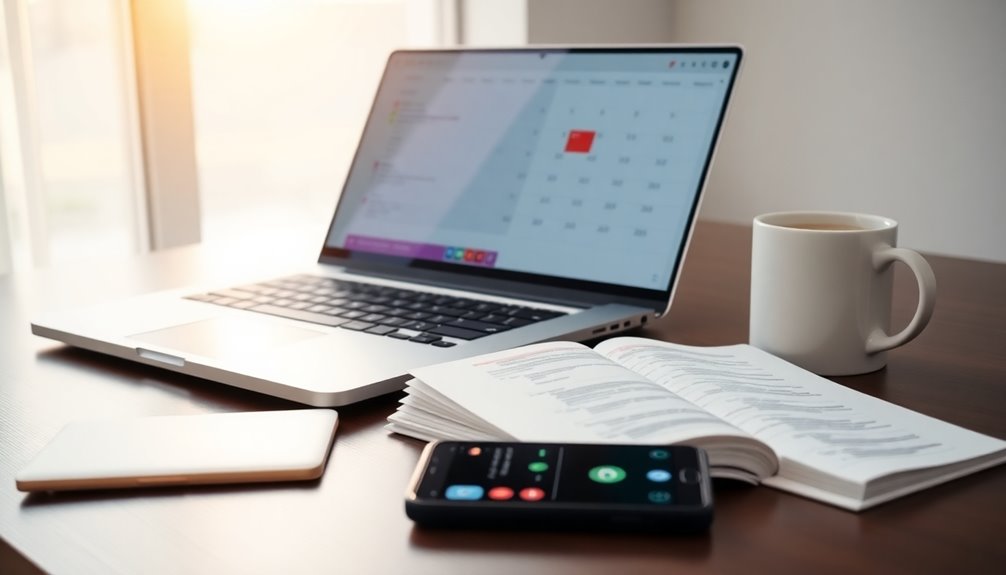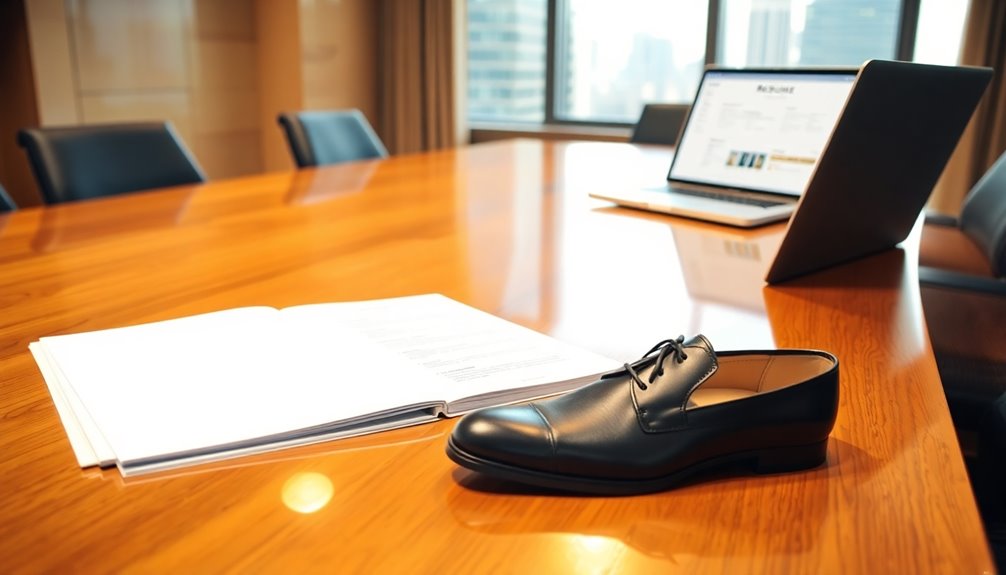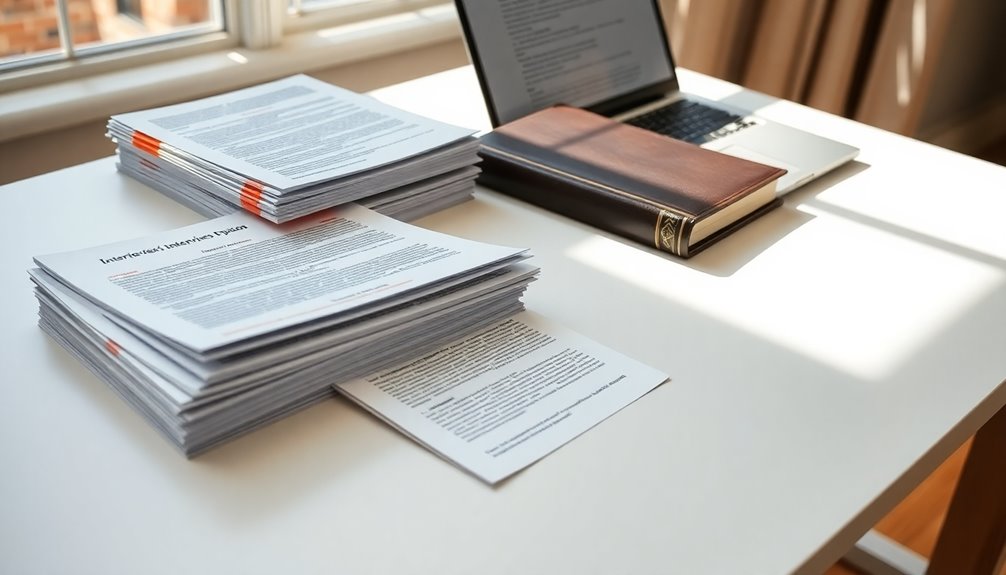Mastering follow-up calls after interviews is essential for showcasing your professionalism and enthusiasm for the role. Start with a quick thank-you note within 1-2 days, referencing specific conversation points. Make your follow-up call about one to two weeks later if you haven't heard back. During the call, express gratitude and reiterate your interest in the position. Keep the tone professional yet friendly, using the interviewer's name. Remember, staying proactive sets you apart from other candidates. Want to enhance your follow-up techniques even further? There's more to discover that can give you an edge in your job search!
Key Takeaways
- Initiate your follow-up call 1-2 weeks after the interview to maintain relevance and demonstrate continued interest.
- Start with a warm greeting, expressing gratitude for the interviewer's time and insights during your meeting.
- Personalize the conversation by mentioning specifics discussed in the interview to reinforce your attentiveness.
- Keep the call brief and focused, respecting the interviewer's time while reiterating your enthusiasm for the position.
- If no response is received, consider a second follow-up a week later to show persistence without being overly aggressive.
Importance of Follow-Up

Mastering the art of follow-up is essential for standing out after an interview. It demonstrates your professionalism and gratitude, leaving a positive impression on the interviewer. A simple thank-you note can markedly enhance how they perceive you.
Timely communication shows you're serious about the opportunity and reinforces your interest in the role. This proactive approach helps interviewers remember you among many candidates. When you follow up, you distinguish yourself from those who don't, and this initiative can lead to job offers or second interview chances.
Crafting Effective Communication
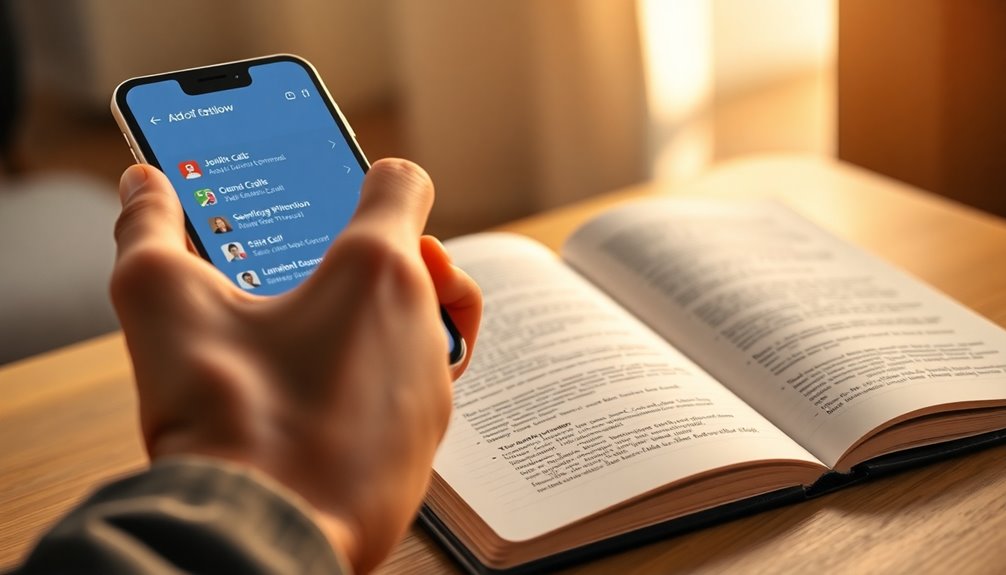
Within a day or two after your interview, it's crucial to craft a thoughtful thank-you note or follow-up email.
This communication not only expresses your gratitude but also reinforces your interest in the position. Here are four key elements to include:
- Personalization: Reference specific topics discussed during the interview to show attentiveness.
- Reaffirm Interest: Clearly state your enthusiasm for the role and the company.
- Highlight Qualifications: Briefly remind them of your relevant skills or experiences that make you a strong candidate.
- Clear Subject Line: Use something straightforward like "Thank You for the Opportunity" to guarantee it stands out in their inbox.
These steps will help you leave a lasting impression while maintaining professionalism.
Timing Your Follow-Up

Timing your follow-up after an interview is essential to making a positive impression. Sending a thank-you note within 1-2 days shows your professionalism and gratitude. For follow-up calls, waiting one to two weeks is ideal, allowing employers time to evaluate other candidates without appearing impatient.
Here's a quick reference table for your timing strategy:
| Action | Timing |
|---|---|
| Thank-you note | 1-2 days after interview |
| Follow-up call | 1-2 weeks after interview |
| Second follow-up | If no response in 1 week |
| Last resort follow-up | 2-3 weeks after interview |
| Final check-in | 1 month after interview |
Follow-Up Methods

After your interview, it's crucial to follow up effectively to keep your candidacy alive in the minds of hiring managers. Here are some methods to evaluate:
- Send a Thank-You Email: Do this within 1-2 days, highlighting specific points from the interview.
- Follow-Up Email: If you haven't heard back in a week, reach out again, referencing your interview date and unique qualifications.
- Phone Call: Think about calling if there's still no response after one or two weeks, but keep it brief and professional.
- LinkedIn Message: Connect with your interviewer on LinkedIn and thank them for their time, reinforcing your interest in the role.
Utilizing these methods helps maintain your presence and shows your enthusiasm for the position.
Preparing for Follow-Up Calls
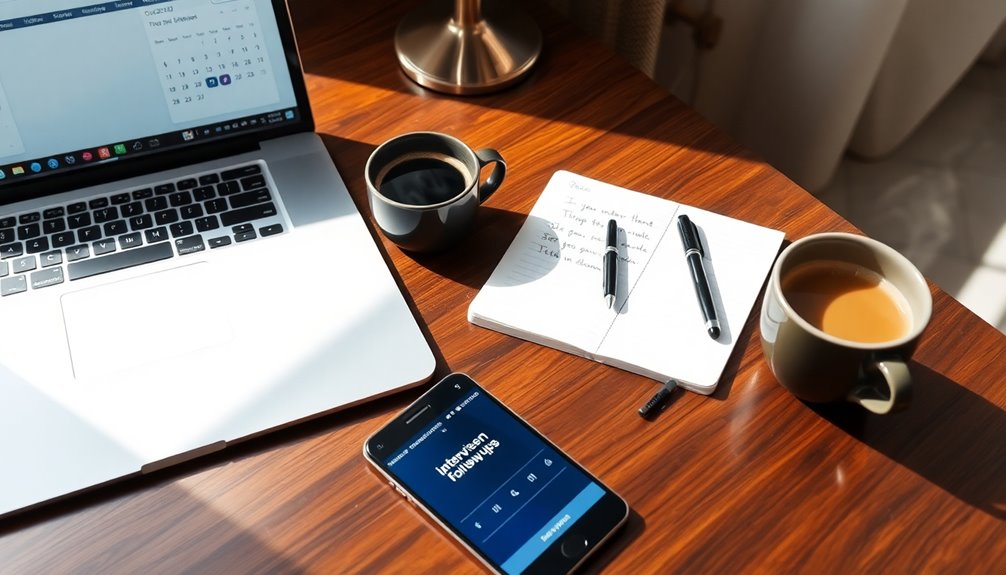
Preparing for follow-up calls requires careful planning to guarantee you communicate effectively and make a lasting impression.
Start by developing a concise script that outlines key points you want to address. Include your full name, the job title, and the interview date to jog their memory. Express gratitude for the interview opportunity and reiterate your interest in the position.
Keep your message focused and succinct; aim for clarity. If you need to leave a voicemail, prepare a brief, friendly message that clearly states your purpose.
Finally, verify you've reviewed any notes from your interview so you can reference specific conversations. This preparation will help you navigate the call confidently and positively impact your chances.
Professional Tone and Connection
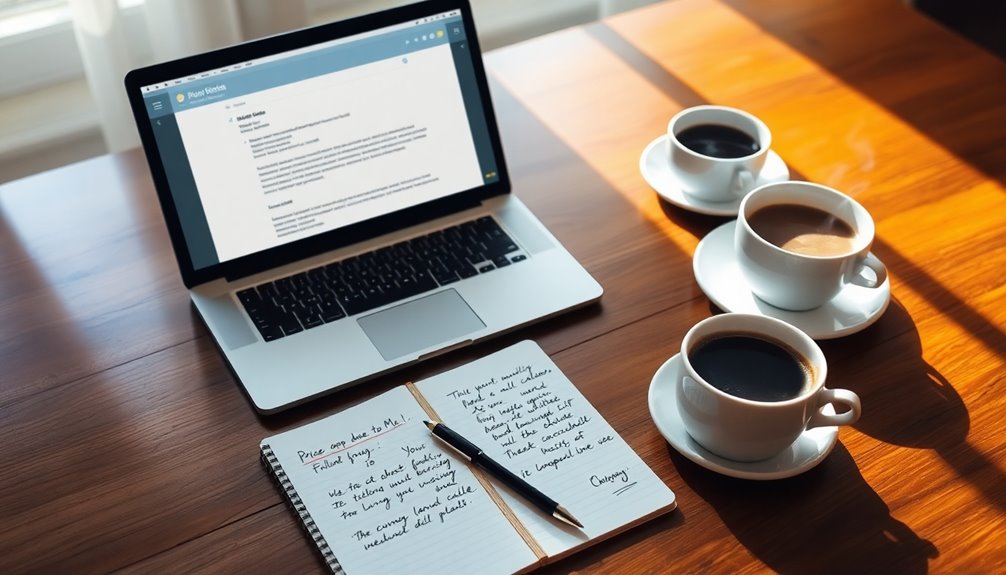
How can you strike the right balance between professionalism and personal connection during a follow-up call? It's important to engage genuinely while maintaining a professional tone. Here are four tips to help you achieve that:
- Be Friendly: Start with a warm greeting and express gratitude for the interview opportunity.
- Use Their Name: Personalize the conversation by addressing the interviewer by their name, reinforcing connection.
- Share a Relevant Anecdote: Mention something specific from your conversation that shows you were attentive and engaged.
- Stay Concise: Keep your message focused and respectful of their time, demonstrating professionalism.
- Incorporate Feedback: Consider incorporating constructive feedback from your interview to show your commitment to customer engagement and feedback loops, which can enhance your connection with the interviewer.
Additional Resources for Success
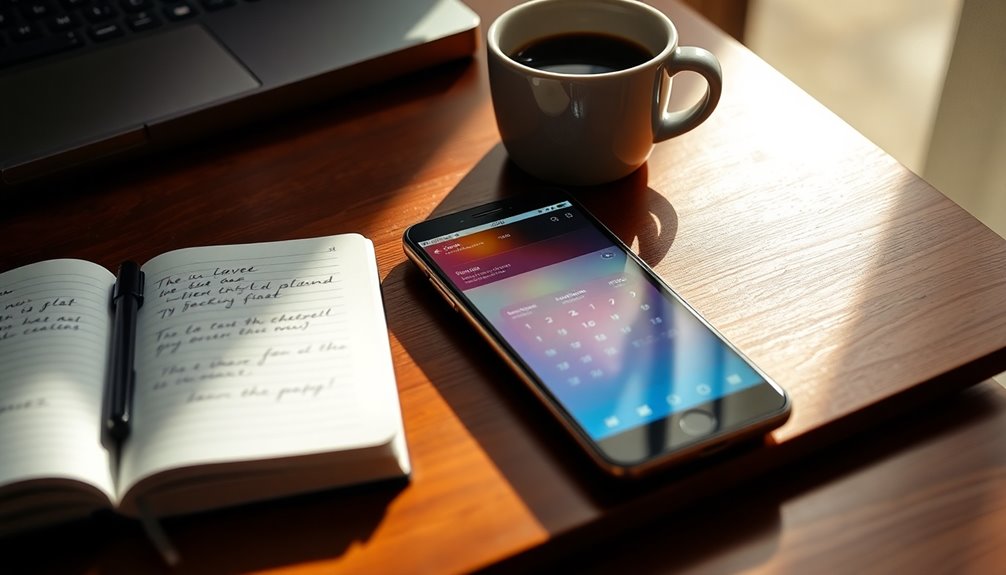
Steering the follow-up process can be intimidating, but having the right resources at your fingertips makes all the difference. You can find useful guides on dos and don'ts for calling after an interview, ensuring your approach is professional and effective.
Familiarize yourself with common waiting periods for follow-up to avoid seeming pushy. Look for tips on making a positive impression post-interview, which can help reinforce your qualifications.
Additionally, consider resources that cover various interview questions and cover letter tips, giving you a well-rounded preparation toolkit. Utilizing these materials can provide you with the confidence to navigate your follow-up calls successfully, leaving a lasting impression on potential employers.
Frequently Asked Questions
What if I Don't Remember the Interviewer's Name?
If you don't remember the interviewer's name, don't panic.
Start by reviewing any emails or messages you received, as they often include names.
If that doesn't help, you can politely address your follow-up communication by acknowledging the meeting without mentioning a name.
For example, say, "Thank you for the opportunity to interview for the position."
This approach keeps your message professional and focused on the role, rather than on the name.
Can I Follow up if I Received a Rejection?
Yes, you can definitely follow up after receiving a rejection. It shows your professionalism and willingness to learn.
Send a brief email expressing gratitude for the opportunity and ask for constructive feedback. This not only helps you improve but also keeps the door open for future opportunities.
Remember to maintain a positive tone; you never know when another position might arise, and your proactive approach could leave a lasting impression.
Should I Follow up for All Interview Types?
Shouldn't you follow up after every interview type? Absolutely! Each opportunity deserves a professional touch.
Whether it's a phone interview or an in-person meeting, following up shows your appreciation and helps you stand out. It keeps you on the interviewer's radar, reinforcing your interest.
Just remember to tailor your message to the interview type, and express gratitude for their time. A thoughtful follow-up could be the key to your success!
How to Handle Multiple Interviews With the Same Company?
When you're handling multiple interviews with the same company, stay organized and keep track of each interview's details.
After each one, send a thank-you note that references specific discussions. This shows your enthusiasm and helps interviewers remember you.
Be prepared to address different interviewers' questions and concerns, reaffirming your interest in the role.
Is It Appropriate to Follow up via Social Media?
It's generally acceptable to follow up via social media, but it depends on the platform and your relationship with the interviewer.
If you're connected on LinkedIn, a polite message can reinforce your interest. Just keep it professional and brief.
Avoid using more casual platforms like Facebook or Instagram unless you've established that kind of rapport.
Always prioritize traditional methods like email for formal communication after an interview.
Conclusion
Mastering follow-up calls can make a meaningful difference in your job search journey. By demonstrating diligence and determination, you can leave a lasting impression on your potential employer. Remember, a well-timed thank-you transforms a typical interaction into a terrific opportunity. So, stay succinct, sincere, and strategic in your communication. With each follow-up, you're not just reinforcing your interest; you're building bridges to brighter career possibilities. Keep that confidence high, and watch your prospects prosper!
Eugene brings a fresh, dynamic voice to our platform as one of our talented Writers. Specializing in research-driven content, he explores the latest findings in psychology and personal growth, translating them into actionable insights for our readers. Eugene’s work is fueled by a curiosity about what makes us tick and a desire to help others unlock their potential.
